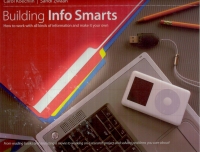| ________________
CM . . . . Volume XV Number 21. . . .June 12, 2009. 
 |
Building Info Smarts: How to Work With All Kinds of Information and Make It Your Own.
Carol Koechlin & Sandi Zwaan.
Markham, ON: Pembroke, 2008.
32 pp., stapled, $12.95.
ISBN 978-1-55138-226-5.
Subject Headings:
Information literacy-Study and teaching (Elementary).
Information literacy-Study and teaching (Secondary).
Professional.
Review by Reesa Cohen.
**½/4
|
| |
|

Koechlin and Zwaan have added another title on the topic of information literacy to their rather large repertoire of already published works on this topic. Over the years of writing in this area, they have established themselves as knowledgeable in the field of students working with
information from a variety of sources.
Building Info Smarts: How to Work With All Kinds of Information and Make It Your Own is written in an attractive flip book format. Once again, the authors focus on providing strategies for learning, using information, with a step-by-step process approach. As they have done in the past, the authors have tried to “cover the waterfront.” This time, the information is divided into seven sections, touching on such topics as learning styles, exploring and reading for research and other purposes, using information resources to build understanding, creating and working with others, applying learning skills for life, and finally, using Info Smarts.
One of the pluses of this resource is the strategy of taking a specific topic in some of the sections as an example of how to deal with learning styles and the myriad of information sources available. It is particularly well done in the section that explores research questions and when the authors give specific authentic examples in “Reading to Research.” This is a valuable technique, and the samples are helpful. The webbing of a topic, the sample organizers and Internet Checklist are easy
to adapt. Boxes of information are highlighted in blues, greens and pinks and colourful exclamation points are scattered throughout the book to direct the reader to important ideas. The package is appealing and inviting on the first read.
The Table of Contents, the list of Web Resources and the Index make this a practical and useable book, but the questions is, “For whom??” The cover and page 1 identify the audience as “YOU,” and so we can assume that the audience is the student. If this is truly the intended target, then the authors and/or publisher should clearly indicate that and provide at least grade or age ranges. There are absolutely no suggestions of appropriate age levels for the work’s use, or even how this work can be adapted for certain grade levels.
And this leads me to one of my two major complaints about Info Smarts. There is a tremendous amount of detail that would make this title overwhelming for students if they were asked to work their way through this publication as they conduct research. And simply handing this out to students as a review would be burdensome. However, it could be used in parts as a reference or guide when teaching students some of the necessary skills. Why have the authors failed to point that out adequately, except on the cover? And why should a reviewer try to find ways that a resource can best be used? This should be part of the responsibility of the creators.
Complaint #2 stems from having reviewed the authors’ Information Power: Teaching Tools for the Information Age back in 1997 for Teacher-Librarian (formerly Emergency Librarian) and Q Tasks in 2006 for CM. I feel that once again the authors have compiled Information Literacy ideas and strategies from their own earlier works as well as adapted ideas from others and then assembled or repackaged these ideas for the student... or in this case for the teacher as well. Borrowing heavily from their own writings is acknowledged on the last page. Because this is a trait that is seen in their previous writings, it most disappointing.
Recommended with reservations.
Reesa Cohen is a retired Instructor of Children’s Literature and Information Literacy at the Faculty of Education, University of Manitoba in Winnipeg, MB.

To comment on this title or this review, send mail to
cm@umanitoba.ca.
Copyright © the Manitoba Library Association. Reproduction for personal use is permitted only if this copyright notice is maintained. Any other reproduction is prohibited without permission.
NEXT REVIEW |
TABLE OF CONTENTS FOR THIS ISSUE- June 12, 2009.
AUTHORS |
TITLES |
MEDIA REVIEWS |
PROFILES |
BACK ISSUES |
SEARCH |
CMARCHIVE |
HOME |
